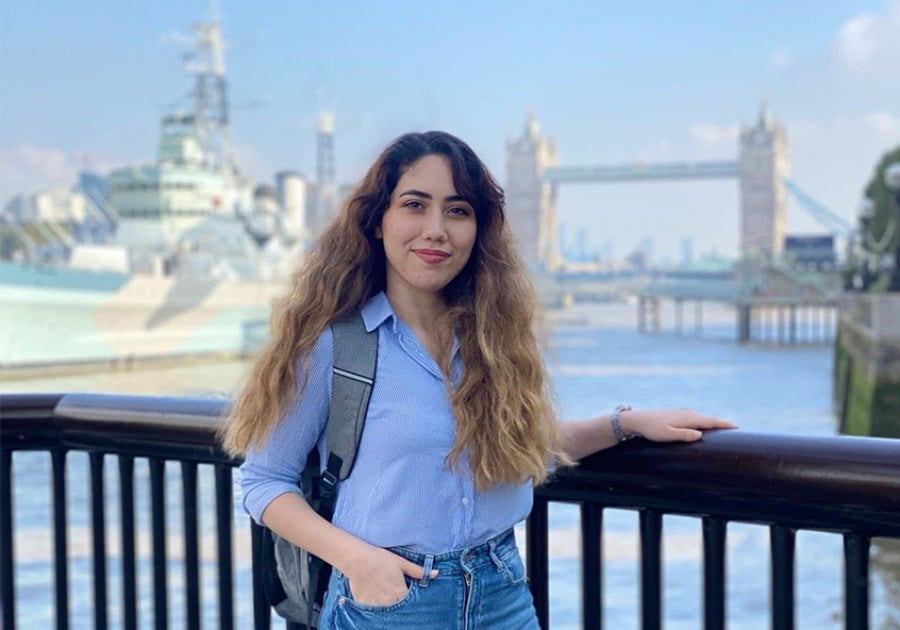Studying the MSc Public Health for Eye Care
10 March 2022 London School of Hygiene & Tropical Medicine London School of Hygiene & Tropical Medicine https://lshtm.ac.uk/themes/custom/lshtm/images/lshtm-logo-black.png
Please explain a bit about your academic/professional background
I’m a Chevening scholar and medical doctor, and I graduated with a Bachelors in Medicine, Bachelors in Surgery (MBChB) with distinction from the University of Baghdad and served as a clinical doctor in both the public and private sectors of Iraq. I also have working experience with organizations such as the International Federation of Medical Students Association (IFMSA), TEDxBaghdad, and the United Nations Development Programme in Iraq. I was an exchange student on leadership programmes and worked on exchange programmes, as well. I recently picked up programming and designed and implemented an online platform that received funding from the UNDP. It focuses on mapping local entrepreneurial solutions to link stakeholders and promote collaboration.
Why did you choose to study your course with LSHTM?
I chose this course because it’s the only course in the world that specifically looks at Public Health for Eye Care and it’s based at the International Centre for Eye Health, which has impacted and changed eye care globally. Coincidentally, LSHTM is my dream school! So it was a perfect match; the dream course at an incredibly renowned institute while living in London and experiencing all the city has to offer.
What has been the highlight of studying at LSHTM so far?
Being elected as the President of the Students Representatives' Council, a role that's been incredibly insightful and super demanding at the same time. It allows me the opportunity of being the link between the student body and the school management and faculty while giving great insights into how academia (and a world renowned research institute such as LSHTM) operates from the planning, financial, and policy levels. Being an LSHTM council member and working closely with its executives’ team, as well as with the students, taught me a lot and I hope I have been able to contribute and create positive impact.
What have you enjoyed most about your course?
The multidisciplinary approach it has. In just one day and for one topic, diabetic retinopathy for example, we would be looking at the clinical aspect (presentations and treatment plans), the research that has been published and its impact on the trajectory of public health solutions implemented for it, health policy and community engagement’s role, technologies’ utilisation in screening, as well as designing outreach plans. Then writing a critical appraisal of its public health interventions for the prevention and control in our local communities. I especially appreciated how the holistic and comprehensive approach of the programme closely mimics real life settings, especially with the ongoing shift of integrating of eye care into health systems.
I especially appreciated how the holistic and comprehensive approach of the programme closely mimics real life settings.
What have been the best aspects of studying in the UK?
Five months in, I still feel like a tourist. My favourites have been the West End plays and the Royal Albert Hall shows. The location of London is great as well, and you have many options for day trips (Brighton, Seven Sisters, Oxford, Cambridge, Kent, the Cotswolds, and even Wales).
Where are some of your favourite study spots around Bloomsbury?
With the course’s intense workload, it is not unusual for you to spend three weeks without leaving Bloomsbury (if you live there as well). I definitely have. The Senate House library is a good place to study and it is only two minutes away from LSHTM (tip: they have a great collection of books you can borrow from). I have also been enjoying studying at the British Museum’s café near the school, although finding power outlets there is a challenge. Studying at the school is always a great idea. The library is good, and we have few quiet study areas. I just had a productive few hours study session there today.
How did you find the mix of online and in-person teaching?
The mix is useful especially because the pre-recorded content allows you to rewind, fast-forward, or listen at x2 the speed. Having the in-person teaching is impeccable though. The mix of the two seems like the best of both worlds but it is always a challenge to achieve the perfect balance. For me, I have definitely enjoyed the in-person sessions more but appreciate how the online aspect allowed for us to have many international lecturers.
What are you currently working on for your MSc?
I’m currently working on my summer project, which explores how eye health technologies (such as artificial intelligence, mobile health, tele-health) could be implemented in the Middle East to eliminate blindness, from the perspective of local multisectoral stakeholders and experts. As well as doing my course work which currently involves designing a training curriculum for ophthalmologists on the importance of monitoring cataract surgical outcomes and outputs, for the Implementing Eye Care module. I’m also doing a systematic review on the impact of tele-health in decreasing urgent care waiting hours, for the Reviewing the Literature module.
How will the programme help you in your career?
Before starting this master’s I was working in what seemed to be scattered outlets, that I all loved, which were clinical medicine, software development, and social entrepreneurship. Now this course has allowed me to explore the ways I can integrate them all to create sustainable and innovative public health solutions for low- and middle-income countries, which has been invaluable to say the least.
What advice would you give to someone considering studying your course?
I do not want to sound all Nike, but the best advice would be to “Just Do it”.
Want to find out more?
Discover our range of intensive master's programmes or speak to Fatma to hear more about her experience.